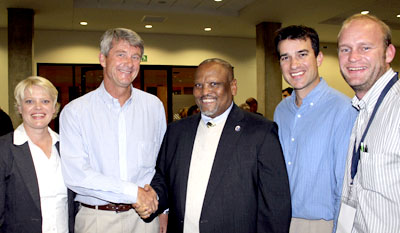Latest News Archive
Please select Category, Year, and then Month to display items
14 June 2024
|
Story Anthony Mthembu
|
Photo Suplied
 Jeremiah Hlahla, a UFS student completing his PhD in Botany at the University of Debrecen as part of an exchange initiative funded by the Erasmus+ Mobility Programme.
Jeremiah Hlahla, a UFS student completing his PhD in Botany at the University of Debrecen as part of an exchange initiative funded by the Erasmus+ Mobility Programme.
As part of an exchange initiative facilitated by the Erasmus+ Mobility Programme, Jeremiah Hlahla, a student at the University of the Free State (UFS), is nearing the completion of his PhD studies at the University of Debrecen in Hungary. Hlahla’s journey, which began in February 2024 and is set to conclude in July 2024, has been a remarkable learning opportunity. “As a first time-traveller to Europe, I have thoroughly enjoyed engaging with people from different countries and cultures,” he said.
The benefits of international collaboration
Hlahla is currently pursuing a PhD in Botany, focusing on plant stress physiology. “My current PhD project investigates the physiological, biochemical and morphological responses of vegetable-type soybean, or edamame, to combined drought and heat stress,’’ he explained. He considers the University of Debrecen the ideal institution to complete his research due to its extensive expertise and resources in similar projects. He noted that his colleagues at Debrecen conduct significant work on plant protection against biotic and abiotic stresses, including salt and drought stress, as well as proteins and amino acids in barley and other legumes.
Given the vast knowledge available on similar projects, Hlahla has found substantial engagement with his work at the University of Debrecen. “Upon arrival, I delivered an introductory lecture presenting my UFS project on the synergistic effects of combined drought and heat stress on the physiology and biochemistry of edamame. It was an engaging session as everyone could relate to my work and asked many questions,’’ he said.
Insights gained from the exchange
Hlahla has also gained valuable lessons that will assist him in his research career, including biotechnology and physiology tools. “I learned how to prepare samples and use high-performance liquid chromatography (HPLC) and reversed-phase ultra-high-performance liquid chromatography (UHPLC) to quantify proteins and amino acids,’’ he said. These techniques are beneficial not only for his current work but will also support future soybean research.
As his experience at the University of Debrecen nears its end, Hlahla reflects on the collaborations and friendships he has formed, which stand out as a significant highlight.
'Physical education at school level important,' says Minister
2010-09-16
 |
|
At the conference were, from the left: Monique de Milander, Prof. Johan Bloemhoff, Rev. Makhenkesi Stofile, Emile Langeveld and Riaan Schoeman.
|
A record number of four staff members from the Department of Exercise and Sport Sciences at the University of the Free State (UFS) presented papers at the South African Sport and Recreation Conference (SASreCon). This conference was presented by Sport and Recreation South Africa (SRSA) from the National Department of Sport and Recreation. This is South Africa’s primary national conference on sport and exercise science.
The conference, that was hosted by the University of KwaZulu-Natal in Durban with the theme Sport, Recreation and Physical Education – An Essential Triad, highlighted the important triangular relationship between sports science, recreation and physical education. A host of leading South African and international speakers presented papers on key topics that are relevant to the South African sports and exercise landscape.
The four staff members who attended also had the opportunity to meet the Minister of Sport and Recreation, Rev. Makhenkesi Stofile. The Minister reiterated the importance of physical education at school level to ensure that South Africa can compete against the best in the world at stadiums such as the iconic Moses Mabhida Stadium, where the function was hosted.